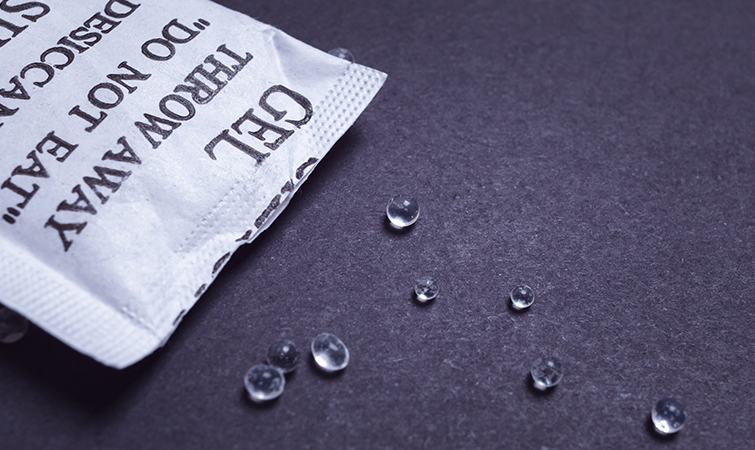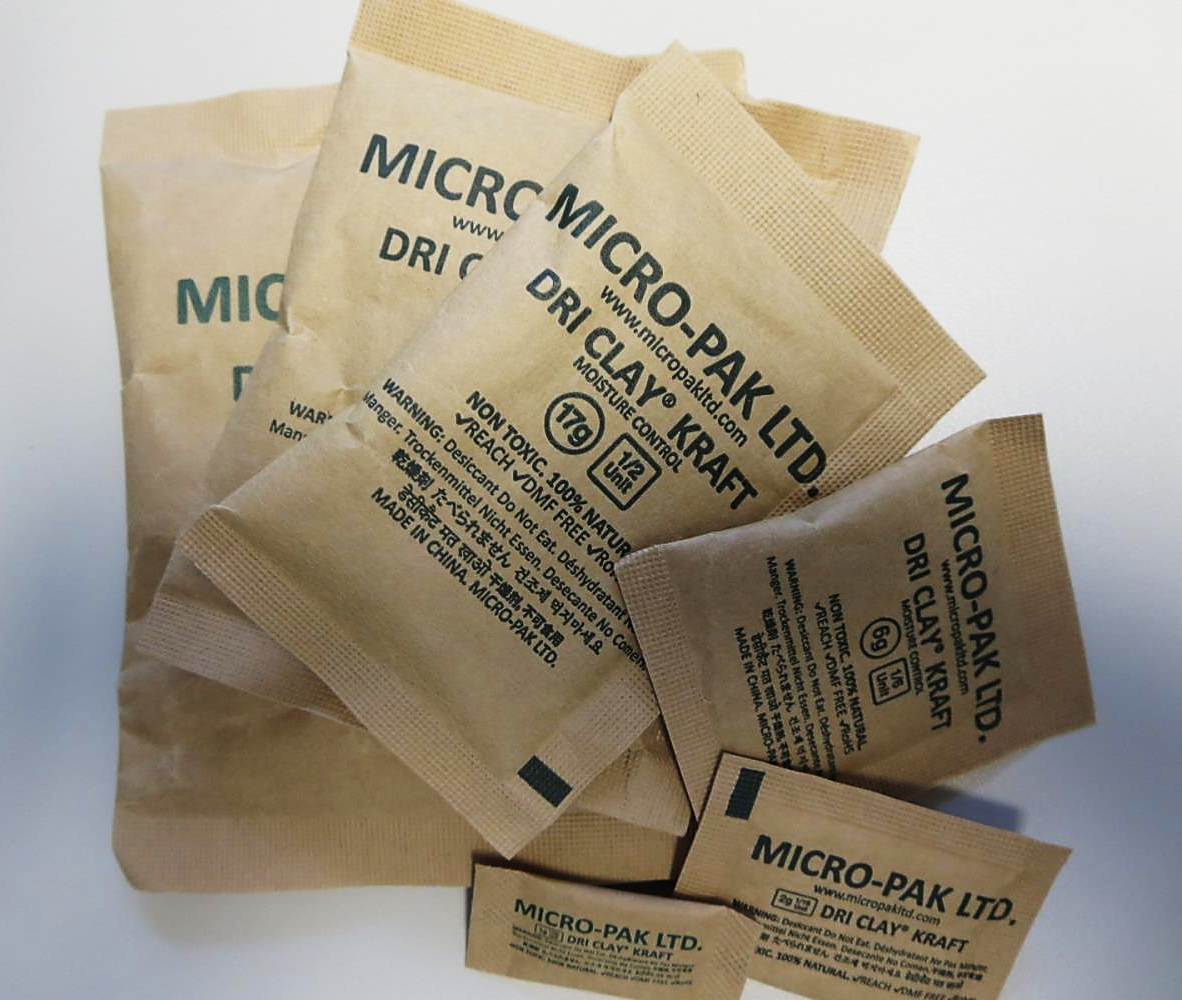Tyvek® Desiccants Remain in Landfill Indefinitely
*skip the article and +shop for Dri Clay® Kraft Biodegradable Desiccants here
Added to packaging that needs to be kept moisture-free, those tiny “Do Not Eat” packets filled with granules often arrive with packaged foods, drugs and durable goods to maintain a state of dryness. Referred to in the industry as a desiccant, these tiny packs are used to prolong, preserve and p rotect goods as they travel along supply chains by removing residual water vapor from inside a sealed containers or packages that if untreated, could result in mold, mildew, rust and corrosion.
rotect goods as they travel along supply chains by removing residual water vapor from inside a sealed containers or packages that if untreated, could result in mold, mildew, rust and corrosion.
Once the sealed package is opened and the item is removed, desiccants are ultimately discarded into the trash. While these small moisture absorbers provide many positive benefits to shippers and consumers alike, the manufacturing processes and materials used to make desiccants are unfortunately negatively impacting our planet.
Many of the desiccants implemented today are constructed of Tyvek®, a DuPont brand of synthetic flash spun nonwoven high-density polyethylene fibers, or simply put plastic. Tyvek® resembles paper and its properties –such as being difficult to tear or puncture but easily cut and waterproof against liquids while allowing water vapor to penetrate— makes this material ideal outer packaging for sorbent packets.
Because these packets are small in size, they’re difficult to recycle and the cumulative quantity of this plastic packaging material is adding up quickly in landfill where it remains indefinitely. With heightened green initiatives and a growing segment of eco-conscious consumers, Tyvek® desiccants are being scrutinized more than ever.
False Illusion
The chemical structure of Tyvek® desiccants renders them resistant to many natural processes of degradation referred to as Oxo-degradable. Oxo-degradable plastic products do not decompose or biodegrade. Instead Tyvek® moisture absorber packets will slowly break down into smaller and smaller pieces and eventually into fine toxic micro-plastic particles.
Plastic pollution is one of the most pressing and critical environmental issues facing the planet. It is an environmental, wildlife, climate, human health and social justice issue that impact everything including the water we drink and many of the foods our families and pets consume.
For many years consumers didn’t give a second thought to how desiccants were made or what happens after they are disposed. Not anymore. Fast forward to today and the plastic desiccant packet you placed inside your sealed package has now become an ambassador for your company and your brand.
Studies show that a growing segment of consumers are expecting sustainable products wherever possible, including desiccants - the very first thing a consumer often sees as they open their prized package. If your packet is not landfill friendly, it could have a negative impact on your brand or company.
Eco-Conscious Consumers
While Tyvek® desiccants seem harmless, they have a tremendous negative environmental impact and carbon footprint. If you employ Tyvek® silica gel, molecular sieve or calcium chloride desiccants into your packaging to protect moisture-sensitive products against deterioration, peeling, mold, mildew, rust or corrosion, then you're unfortunately contributing to pollution , litter, micro-plastic and today’s consumers recognize this.
, litter, micro-plastic and today’s consumers recognize this.
A Sustainable, Safe & Effective Alternative for Your Active Packaging
You can easily strengthen your brand and protect products longer while preserving the planet simply by converting to Micro-Pak® Dri Clay® all natural, certified plastic-free biodegradable desiccants.
Dri Clay® desiccants will decompose 90% within 30 days yet offer the best possible protection to any product—especially those sensitive to moisture like textiles, home furnishings, wood, paper, electronic appliances, medical devices, metal components and many others.
Made with all natural bentonite clay that is packaged in a high quality sustainable Kraft paper, Dri Clay® desiccants are biodegradable certified per ASTM standard D5511 and ISO 15985 and FSC (Forest Stewardship Council) certified. Dri Clay® Kraft desiccant packs also meet U.S. FDA requirements for contact with food and pharmaceuticals.
Regulatory Compliance:
- REACH Exempt and passes all Substances of Very High Concern (SVHC) tests
- ASTM D5511 and ISO 15985 Biodegradable
- Forest Stewardship Council (FSC)-certified Kraft paper
- Plastic-Free Certified
- AFIRM
- EPA compliant
- RoHS compliant.
- US FDA (Food and Drug Administration) compliant for contact with food and drugs
Proven to Out Perform Synthetic Desiccants
Micro-Pak Dri Clay® is the most sustainable and effective desiccant on the market, defending your goods from moisture and extending shelf life. Dri Clay® sustainable moisture absorber packets are proven to reduce humidity faster and to lower levels than silica gel and calcium chloride. In addition, the production processes require zero chemical inputs or additives, as well as low energy and low water consumption resulting in a small carbon footprint.
Micro-Pak® Dri Clay® desiccant packets are environmentally responsible, non-toxic, can be safely disposed in landfill where clay is returned to the earth in its natural state. Featuring water-based inks and adhesives, Dri Clay® does not release harmful or toxic chemicals into the soil nor does it contaminate water systems.
There is no risk of leakage and unlike other desiccants, the top-grade clay never changes size, shape, or texture, even when at full absorption capacity. The sachet has a quality seal, is hard to tear, dust-free, has good breathability and does not contain binders or solvents.
Made with less packaging materials than other common desiccants, Micro-Pak® Dri Clay® is also available in five sizes to fit your packaging, allowing you to eliminate moisture economically.
Sizes:
- 1 gram | 1/33 Unit (6000 count)
- 2 gram | 1/16 Unit (4000 count)
- 6 gram | 1/6 Unit (2000 count)
- 17 gram | 1/2 Unit (800 count)
- 33 gram | 1 Unit (400 count)
- 66 gram | 2 Unit (200 count)
NEW PRODUCT ADDITION 2024
Made from 100% recycled material, Micro-Pak® MPCD ECO® advanced cargo container desiccants aggressively removes moisture from the air inside cargo shipping containers absorbing up to 300% of its own weight at 90% relative humidity and 40°C to prevent condensation and protect products from all forms of moisture related damage during transit shipment and storage. +Micro-Pak® MPCD ECO® Container Desiccants are made of a high purity deliquescent salt combined with a scientifically modified starch. This advanced formula maximizes absorptive capacity and aggressively traps and binds moisture as a thick, no-spill gel for up to 90 days or until full saturation. Micro-Pak® MPCD ECO® container desiccants are safe, non-toxic, can be safely disposed with regular waste and are fully compliant with REACH and a wide range of international regulations
Don’t contribute to the problem, be a part of the solution. Show your customers you care about the environment while protecting your brand along the distribution chain. Appreciated by consumers, implement these high-performing Dri Clay® biodegradable desiccant packets into your active packaging today. All you need to do is tap the link and ...
+shop for Dri Clay® Kraft Biodegradable Desiccants here
Monday - Friday 8:30am - 4:30pm Eastern Time
Call or Click Today
Orders. Questions. Volume Discounts. Evaluation Samples.
+(800) 274-4637 | +(716) 668-4001 | [email protected] | eco-MDSassociates.com | MDSassociates.com
+click for PDF Dri Clay® Kraft Brochure here
+click for PDF Dri Clay® Kraft Fact Sheet here
+click for PDF Dri Clay® Kraft Guideline here
+click for PDF Dri Clay® Environmental & Sustainability Highlights here
+click for PDF Dri Clay® vs Silica Gel Environmental Impact Summary here
+click for PDF Dri Clay® Kraft vs Silica Gel Impact & Sustainability Comparison here



